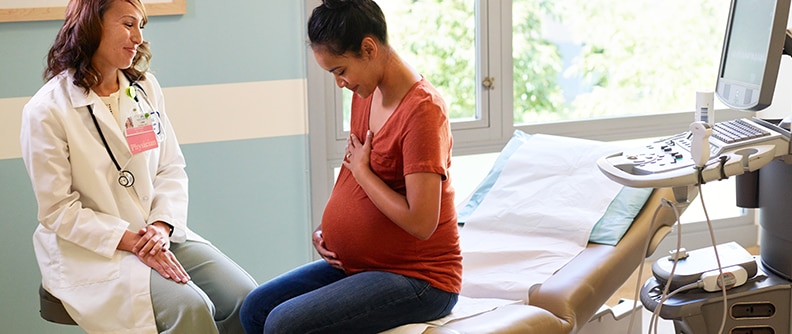As a Kaiser Permanente member there are a few different types of prenatal care options available to you. The clinician that you’ll see at your first prenatal appointment, which usually takes place between 6 and 10 weeks, will go over the options and you can discuss what would be the best approach for you and your individualized needs. Here’s a preview as to what the different types of care look like.
What are the different types of clinicians I can receive care from?
For your prenatal care, you can be seen by an obstetrician (ob-gyns), a doctor who cares for pregnant people and deliver babies. 94% of our ob-gyns are board-certified — that means they’ve had extra training to become highly skilled in their field.
In most Kaiser Permanente service areas, you can also see a certified nurse-midwife. These are board-certified advanced practice registered nurses who specialize in maternity care and infant delivery. Midwives deliver babies and provide holistic family-centered care during pregnancy, labor, and after birth.
Sometimes, your primary care physician is a family practitioner who has received added training in pregnancy care. In these cases, you can receive your prenatal care from your family practitioner if you choose.
At any point during your pregnancy, you can change and see a different clinician. Your health history is in your electronic medical record so any ob-gyn, certified nurse-midwife, family practitioner or specialist can know your history with a click of a button.
What are my prenatal care options?
In addition to the types of clinicians you might see to support you in your pregnancy, there are also different ways of receiving prenatal care.
The first is a more traditional or typical care pathway where you would receive all of your appointments in-person, one-on-one with your clinician, whether they be an ob-gyn, midwife or family practitioner. This type of care is great for any individual, particularly those who may be experiencing a high-risk pregnancy.
In many Kaiser Permanente areas, we offer group prenatal care, called CenteringPregnancy®. Centering is a unique approach to prenatal care that includes group sessions with other parents-to-be whose babies are due around the same time as yours. The sessions are led by our Centering physicians, nurse practitioners, or certified nurse-midwives. You’ll still have one-on-one prenatal appointments with your care team.
Right now, we’re holding our Centering group meetings virtually (online). In the group sessions, you’ll talk about things like:
- Managing pregnancy symptoms
- Exercising
- Eating healthy
- Reducing stress
- Preparing for labor and childbirth
- Breastfeeding
- Caring for your newborn
- Caring for yourself after childbirth
What are some of the benefits of CenteringPregnancy®?
- Create a community that empowers you to be actively involved in your own care and make healthy choices during your pregnancy and beyond.
- Learn new skills such as relaxation exercises and ways to comfort your new baby.
- Groups are lively, interactive, and fun!
- Centering gives you lots of time to get to know other parents-to-be and ask questions in a supportive group environment.
- Plus, it’s a great chance for you and your care team to get to know each other better.
- It’s also convenient. You’ll know all the dates and times of all your appointments in advance, so you can plan ahead.
How can I get more information about Centering?
Ask your clinician if Centering is right for you when you come in for your first prenatal visit. To learn more about Centering, call the coordinator at the hospital nearest you.
Maternity care with at-home toolkit: Our latest prenatal and postnatal care offering
Kaiser Permanente is offering a new way of receiving maternity care. With this care option, you’ll get a mix of in-person office visits and video visits* from the comfort of home. In consultation with your clinician, you’ll decide together if this is the right pregnancy pathway for you.
If you choose this form of care, you’ll receive an at-home toolkit to support your video visits. The toolkit contains devices to use at home to help you stay on top of your health. These devices include a fetal doppler device to detect the baby’s heart rate and a Bluetooth-enabled blood pressure monitor and weight scale that pair with a companion app to send readings directly to their electronic health record. The readings are reviewed by the member’s care team and discussed during the video visits to monitor the pregnancy and respond to any concerns. This is one way you and your care team can stay connected throughout your pregnancy and postpartum journey. Of course, you’ll still come in during important moments in your pregnancy to be seen in person by your clinician and to get labs and ultrasounds.
What happens if my baby or I develop health problems during my pregnancy?
If your pregnancy becomes high-risk and either you or your baby have an increased chance of a health problem, your care team may want to see you more often to provide you with the special care you need. They may schedule you for more video visits* or change your video visits to office visits. Your care team may also ask you to use the at-home devices more often to help you monitor your health. Your clinician will work with you to make sure you and your baby are getting the care you need. Your health is our top priority, and we’ll move quickly to make sure you and your baby are safe and healthy.
You’ll have the flexibility to get high-quality pregnancy care in a way that works for you, both from home and in-person during an office visit.
If during your pregnancy you decide you want to change a video visit to an office visit, that’s not a problem. Just email your care team or call the appointment center to change your visit.
*When appropriate and available.
